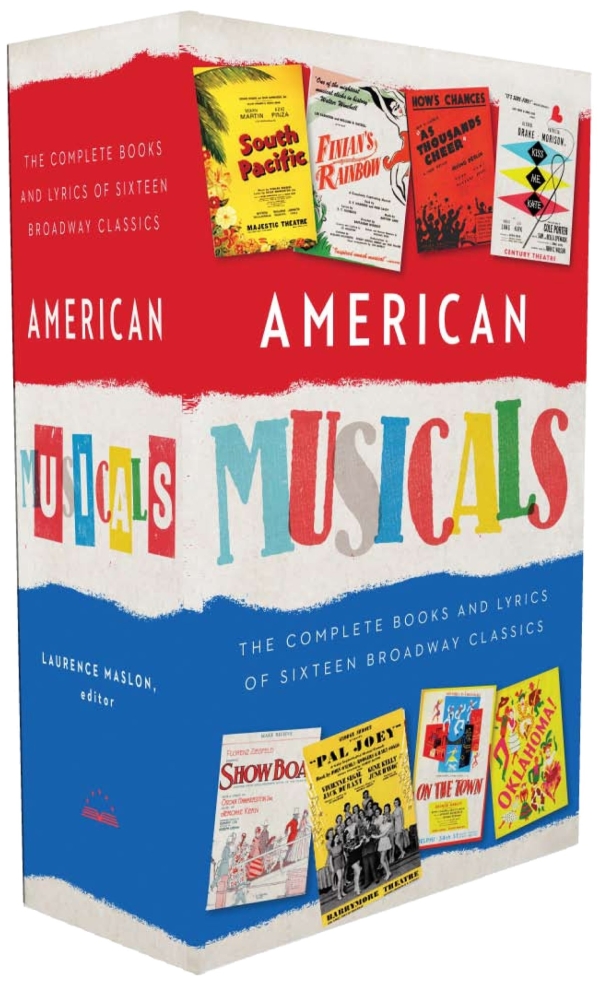Theater Historian Laurence Maslon Brings 16 Great American Musicals Back Into Publication

The period of 1927-1969 was an amazing era for American musicals: Show Boat, the first real book musical; the entirety of the Rodgers and Hammerstein canon, which even further advanced the genre from the revue to the integrated story-music format we know today; Guys and Dolls; West Side Story — the list seems endless. So how do you choose the perfect 16?
That was the task that fell to Laurence Maslon, a theater historian and one of the people behind the documentary series Broadway: The Golden Age and professor at NYU's Tisch School of the Arts, who was chosen by the Library of America to edit a two-volume set titled American Musicals (1927-1969). It's a daunting assignment, and one that's bound to have some theater fans up in arms. But Maslon is taking it in stride now that the handsome box set is on bookshelves. TheaterMania spoke with Maslon about how he honed his selection process and how that era of American musical theater is so vastly different from today's.
The book set spans the period of 1927-1969. What were the criteria for narrowing down all of the titles written over that 42-year period to just 16?
You had to begin with Show Boat — there wasn't much before that — but then what would you do? It was important to get the Rodgers and Hammerstein titles and to work from there out. The two governing principles were that this is not the sixteen greatest musicals ever; it's the sixteen books and lyrics within a reasonable chronological bracket. They had to be readable. They had to endure without music and choreography and a star performance. That self-selects a certain number of shows out. And since it was for Library of America, they had to be read in an anthology somewhat sequentially, so they had to speak to each other.
There will certainly be some controversy among musical-theater enthusiasts — no Carousel or West Side Story, for instance.
Personally, I think Carousel may be the best of Rodgers and Hammerstein's work. If you're trying to say something about the history of the musical, you have to have Oklahoma! It's important for a lot of reasons to have South Pacific, and you couldn't have three of them, so maybe Carousel doesn't make the cut. West Side Story wasn't a contender because it was really about the music. In my opinion, it's got fine lyrics and an OK book, but fantastic music and fantastic performances, so it sunk a little further down the totem pole. For me, something like Pajama Game, which people may not feel like is the greatest of all time, was certainly incredibly representative of its era. In an anthology, it made a really good transition from Guys and Dolls to My Fair Lady.

What surprised me about this set of texts is how many of them are based on previous source material, which is a trend we tend to think is exclusive to the musicals of this generation.
As Thousands Cheer is original. Finian's Rainbow is original. On the Town is original. I think it's certainly the case that shows that are based on previous source material now are much more slavishly adapted from their source material. It's been said many times, but in the 1960s, you wouldn't get very far with a musical called The Apartment [retitled Promises, Promises for the stage], but now, you wouldn't think of adapting a show from a movie and changing its title. The book covers that in a way, how this particular group up to 1969 considered material and changed it from its sources and made it its own. I think it's a lot more imaginative and more creative than the way people do it today.
If you were to create another set, American musicals from 1970 to the present, what titles would be included?
As a historian, I tend to be very conservative in so far as you never know. I would love it if the next thing Library of America does is a Sondheim-Prince volume, and it makes a lot of sense. You have to wait and see how things play out. Even a show like Into the Woods [from 1987] is finally being made into a movie [now]. In musical theater as a popular form, you really have to wait twenty or thirty years to see what lands and proves to be timeless. That's certainly what I think these sixteen shows [in this volume] are. They'll always be done.










